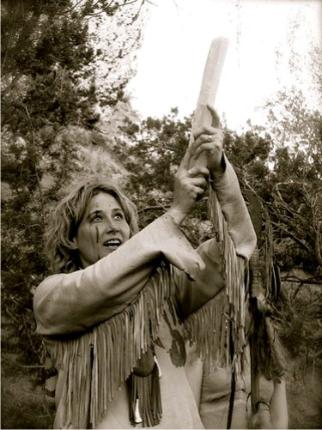Settler Colonialism and the Imagined Indigenous ViewpointBy SanguinityIn "A Tribe Called Wannabe" (pdf), Rayna Green writes about an incident when white historical re-enactors went through some trouble to learn how to play lacrosse, and even make "authentic" lacrosse sticks, in order to "authentically" re-enact the roles of historical Iroquois and Ojibway in a particular battle. When asked why they didn't just invite contemporary Iroquois and Ojibway to play those roles--people who already had the relevant knowledge--the white re-enactors eventually admitted that the point of even doing the re-enactment was that they had wanted to play the Iroquois and Ojibwe roles themselves. Green writes (emphasis mine),
The need to replay the roles, replay the battles, replay the historic scenes is there, especially when the distance of time has not resolved the historical ambiguity about the actions of one's ancestors, or when the reconstruction of the past seems more glorious than the present. ... In that world, not only do Indians not play Indian, but the role for whites to play is not the one they want. They already know that role. It is the "Indian" they want and want to be.
When one lives in a settler-colonialist state, when one is ashamed of or conflicted about one's settler privilege or the actions of one's ancestors, it can appear to be emotionally simpler, easier, to identify with an indigenous viewpoint. "If I had lived then," so many of these books and movies say, "I would have done differently. I would have been on the side of the Natives."
Almost always: would have done. Would have been.
Almost never: am doing.And:
With respect to the second point I want to bring forward, here's Andrea Smith, writing in "Heteropatriarchy and the Three Pillars of White Supermacy" (pdf), elaborating on a major point of Rayna Green's:
...the current Indian "wannabe" phenomenon is based on the logic of genocide: non-Native peoples imagine themselves as the rightful inheritors of all that previously belonged to "vanished" Indians, thus entitling them to ownership of this land. ... After all, why would non-Native peoples need to play Indian--which often includes acts of spiritual appropriation and land theft--if they thought Indians were still alive and perfectly capable of being Indian themselves?Comment: The first attitude--feeling ashamed of or conflicted about one's ancestors--is mainly a liberal one. It's the attitude held by
New Age believers and (probably)
European hobbyists. "Our ancestors were corrupt and greedy. The Indians were noble and pure. I wanna be all natural and wholesome and spiritual just like them."
Of course, I'm a liberal, but I don't feel ashamed of or conflicted by my ancestors. It seems pretty simple to me. If they thought about Indians at all, they were probably racists and therefore wrong.
I don't "wanna be" an Indian to refight these battles. If I went back in time, I'd be a white guy on the sidelines denouncing the liars and hypocrites. Just as I'm doing now. <g>
The second attitude is more of a conservative one. "We honor the Indians as fierce warriors (but never as brilliant thinkers). Just look at them on our
sports logos and
military craft, where their fighting and killing spirit lives on. If you want to convey a "take no prisoners" attitude, what better way than with an Indian?
"Indians fought bravely for their land and people, but lost to a superior civilization. We beat them fair and square, so now America is ours. By honoring them, we honor our own greatness."
For more on the subject, see
Indian Wannabes = Celebrity Wannabes and
Smashing People: The "Honor" of Being an Athlete.



3 comments:
"The second attitude is more of a conservative one. "We honor the Indians as fierce warriors (but never as brilliant thinkers). Just look at them on our sports logos and military craft, where their fighting and killing spirit lives on. If you want to convey a "take no prisoners" attitude, what better way than with an Indian?"
I might have missed if you answered before, but do you have any evidence that liberal sportsfans dislike, say, Chief Wahoo, and conservtives like him?
I don't think anyone has surveyed mascot love by political affiliation, so I don't have any hard evidence. I just have impressions and anecdotes from years of experience in the field.
I'd say most people are oblivious to the political and cultural messages inherent in mascots. Liberals may be slightly less oblivious to these messages, but that's about all.
That really fits with what I have noticed as well.
Which might change your "The second attitude is more of a conservative one.....look at them on our sports logos and military craft" statement.
Post a Comment